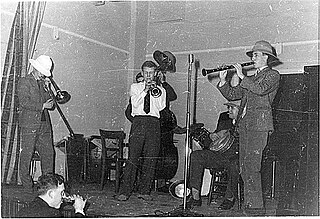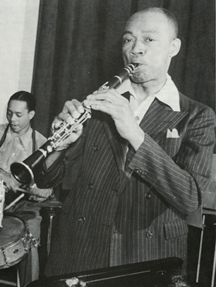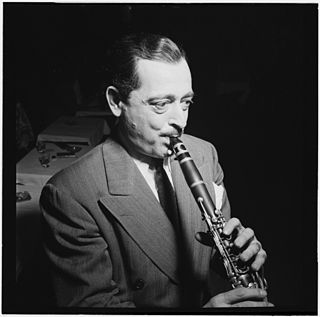Chris Tyle (born May 1955) is dixieland jazz musician who performs on cornet, trumpet, clarinet and drums.
Chris Tyle (born May 1955) is dixieland jazz musician who performs on cornet, trumpet, clarinet and drums.

Tyle grew up in a musical family. His father, Axel Tyle (1912–1981), was a jazz drummer and member of the Portland, Oregon-based Castle Jazz Band. [1]
Tyle's first musical job was with Don Kinch's Conductors Ragtime (1976–1979). Kinch (1917–2011), played with Axel Tyle in the Castle Jazz Band in the late 1940s, and went on to work with the Turk Murphy Jazz Band and the Firehouse Five Plus Two.
In 1979 Tyle played and recorded with the Turk Murphy Jazz Band in San Francisco, then returned to Portland to form a swing music band named Wholly Cats (named after a number written and recorded by Benny Goodman and Count Basie). The band was a popular fixture on the Portland scene from 1979–1984, releasing an album in 1982. After disbanding the group's vocalist and guitarist, Rebecca "Becky" Kilgore, went on to become a popular freelance artist and has made many recordings and festival appearances. [1]
Tyle moved to New Orleans in 1989, immediately becoming an in-demand performer with a number of groups, including Steve Pistorius's Mahogany Hall Stompers, Jacques Gauthe's Creole Rice Jazz Band, and John Gill's Dixieland Serenaders . He also worked with jazz greats Danny Barker (guitar) and Albert "Pud" Brown (clarinet/sax). In 1992 Tyle formed the Silver Leaf Jazz Band which worked six nights-a-week at the Royal Sonesta Hotel on Bourbon Street.
In 2002 Tyle returned to the Pacific Northwest to pursue a freelance career. Up until 2015 he performed regularly with the Titanic Jazz Band of Los Angeles, Combo DeLuxe of Seattle/Tacoma, and "subbed" with Bob Schulz' Frisco Jazz Band of San Francisco and other West Coast traditional jazz bands. He also has frequently performed in Europe, most notably with the Gambit Jazzmen of England. [1]
In 2006 he became a member of the orchestra for the musical A la Recherche de Joséphine (Looking for Josephine), directed and written by Jérôme Savary, and starring Nicolle Rochelle. The show ran for six months in 2006-2007 at the Opéra-Comique in Paris, France, and has subsequently toured in France, performed in Vienna, the United States, and Lebanon.
Tyle has made over 70 recordings with a variety of groups, including eight with his Silver Leaf Jazz Band. A song from his Silver Leaf Jazz Band album The Smiler (Stomp Off) was used in the PBS documentary Jazz . Another Silver Leaf Jazz Band album, New Orleans Wiggle (Jazzology), received the highest rating in the Penguin Guide to Jazz on CD 2003, one of only ten recordings in the book to receive this rating.
In addition to musical performance, Tyle is a writer and educator. He has written many articles and is a contributor to Jazz Standards. He is a member of the International Association of Jazz Educators and the Jazz Journalists Association.
Tyle moved to France in October 2015 and retired from full-time performance, due in part to a medical condition known as essential tremor which is exacerbated in performance situations. He continues to play clarinet at home. [1]
Chris Tyle's Silver Leaf Jazz Band of New Orleans
Turk Murphy Jazz Band

The Original Dixieland Jass Band (ODJB) was a Dixieland jazz band that made the first jazz recordings in early 1917. Their "Livery Stable Blues" became the first jazz record ever issued. The group composed and recorded many jazz standards, the most famous being "Tiger Rag". In late 1917, the spelling of the band's name was changed to Original Dixieland Jazz Band.

Pierre Dewey LaFontaine Jr., known professionally as Pete Fountain, was an American jazz clarinetist.
Jazz standards are musical compositions that are an important part of the musical repertoire of jazz musicians, in that they are widely known, performed, and recorded by jazz musicians, and widely known by listeners. There is no definitive list of jazz standards, and the list of songs deemed to be standards changes over time. Songs included in major fake book publications and jazz reference works offer a rough guide to which songs are considered standards.

Trad jazz, short for "traditional jazz", is a form of jazz in the United States and Britain that flourished from the 1930s to 1960s, based on the earlier New Orleans Dixieland jazz style. Prominent English trad jazz musicians such as Chris Barber, Freddy Randall, Acker Bilk, Kenny Ball, Ken Colyer and Monty Sunshine performed a populist repertoire that also included jazz versions of pop songs and nursery rhymes.

Robert Sage Wilber was an American jazz clarinetist, saxophonist, and band leader. Although his scope covers a wide range of jazz, Wilber was a dedicated advocate of classic styles, working throughout his career to present traditional jazz pieces in a contemporary manner. He played with many distinguished jazz leaders in the 1950s and 1960s, including Bobby Hackett, Benny Goodman, Sidney Bechet, Jack Teagarden and Eddie Condon. In the late 1960s, he was an original member of the World's Greatest Jazz Band, and in the early 70s of Soprano Summit, a band which gained wide attention. In the late 1970s, he formed the Bechet Legacy Band.

James Dugald "Jimmy" McPartland was an American cornetist. He worked with Eddie Condon, Art Hodes, Gene Krupa, Benny Goodman, Jack Teagarden, and Tommy Dorsey, often leading his own bands. He was married to pianist Marian McPartland.

Melvin Edward Alton "Turk" Murphy was an American trombonist and bandleader, who played traditional and Dixieland jazz.

Edmond Hall was an American jazz clarinetist and bandleader. Over his career, Hall worked extensively with many leading performers as both a sideman and bandleader and is possibly best known for the 1941 chamber jazz song "Profoundly Blue".

Donald Tyson Ewell was an American jazz stride pianist. He worked with Sidney Bechet, Kid Ory, George Lewis, George Brunis, Muggsy Spanier, and Bunk Johnson.

Tony Parenti was an American jazz clarinetist and saxophonist born in New Orleans, Louisiana, United States. After starting his musical career in New Orleans, he had a successful career in music in New York City for decades.

Lars Ivar Edegran is a Dixieland jazz musician and bandleader from Sweden. He most often plays piano, guitar, or banjo but has also played mandolin, clarinet, and saxophone.

Albert Nicholas was an American jazz clarinet player.
Joseph Robichaux was an American jazz pianist. He was the nephew of John Robichaux.
Richard MacQueen Wellstood was an American jazz pianist.
Clint Baker is an American traditional jazz musician performing on cornet, trumpet, trombone, clarinet, saxophone, guitar, banjo, tuba, string bass, and drums.
Ernie Carson was an American Dixieland jazz revival cornetist, pianist, and singer. He was born in Portland, Oregon.
Dixieland jazz, also referred to as traditional jazz, hot jazz, or simply Dixieland, is a style of jazz based on the music that developed in New Orleans at the start of the 20th century. The 1917 recordings by the Original Dixieland Jass Band fostered awareness of this new style of music.
The Original Salty Dogs Jazz Band is a traditional jazz ensemble founded in 1947 in West Lafayette, Indiana, and later based in Chicago, Illinois. The Salty Dogs play standards and original pieces influenced by the Dixieland artists of the 1910s and 1920s, as well as the 1940s and 1950s "revivalists" such as Lu Watters and Turk Murphy.
The Castle Jazz Band was a Dixieland jazz band, part of the "West Coast revival" of traditional jazz music. Their recordings were popular worldwide for a time, although touring outside their Portland, Oregon base was limited.

Tom Roberts is an American pianist, composer, and arranger, a specialist in the stride piano style, and a expert on early jazz piano and jazz recordings. Tom is a master of all early jazz piano styles including ragtime, boogie woogie, swing, New Orleans jazz, and Harlen Stride piano.